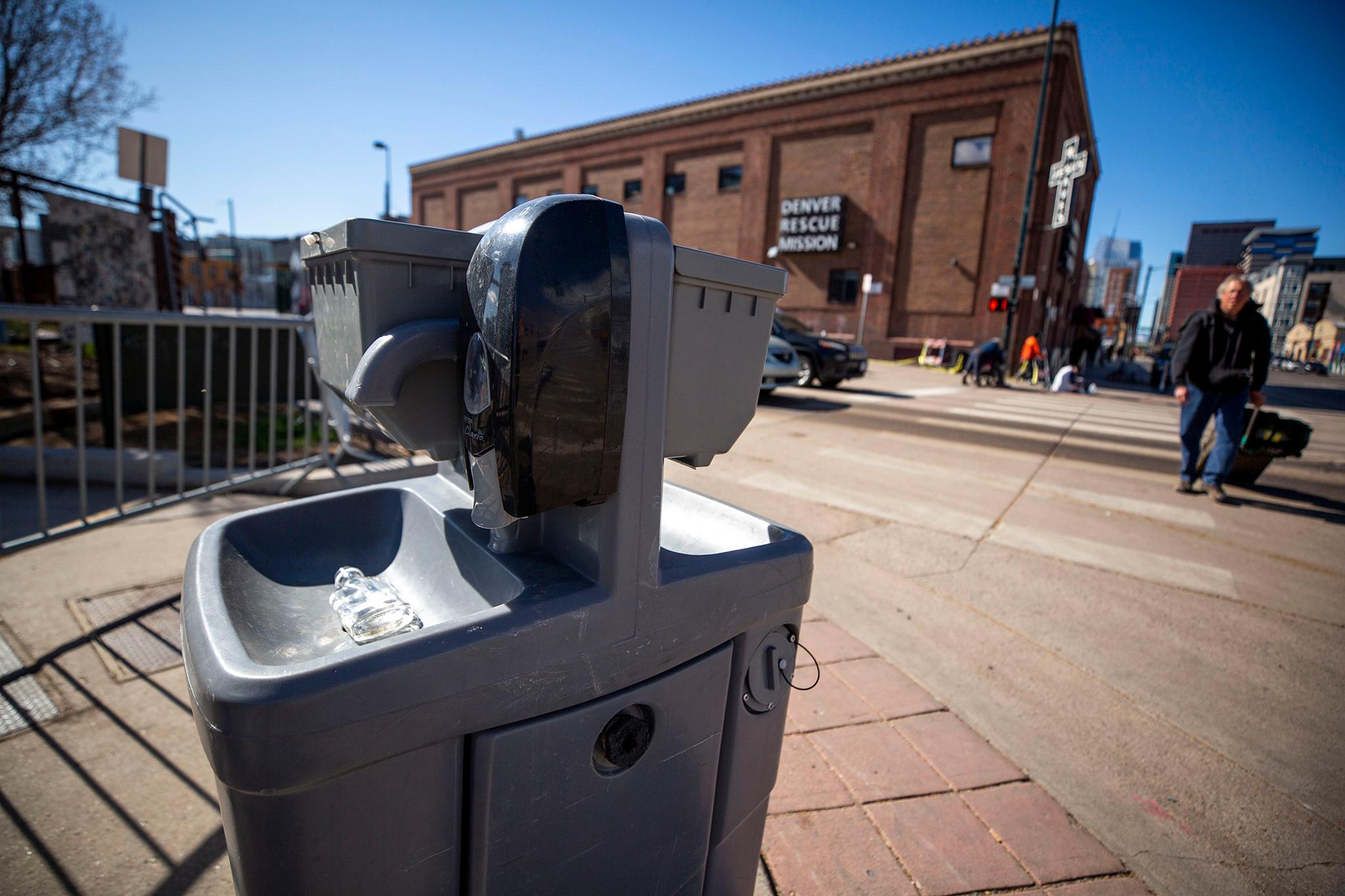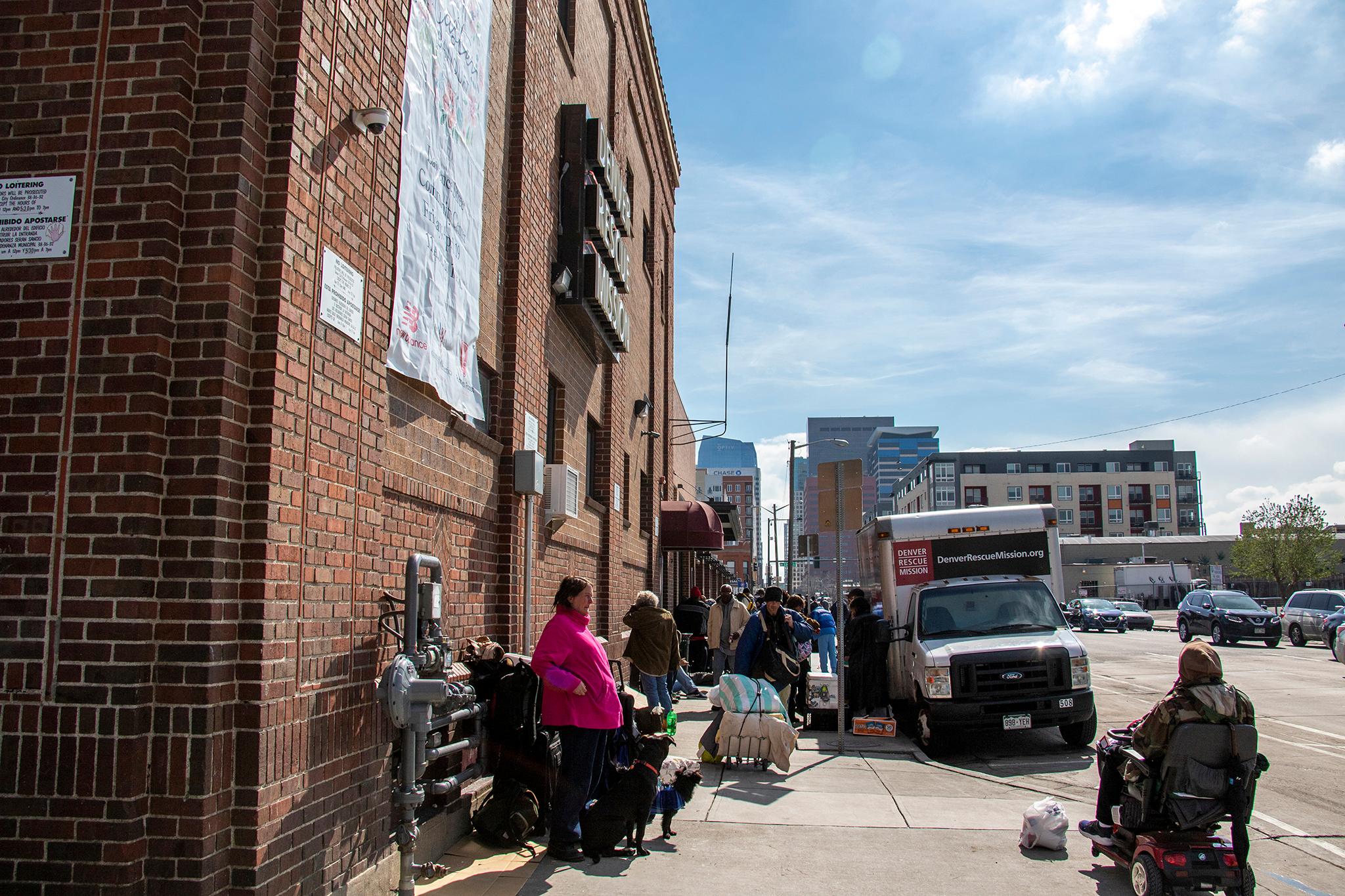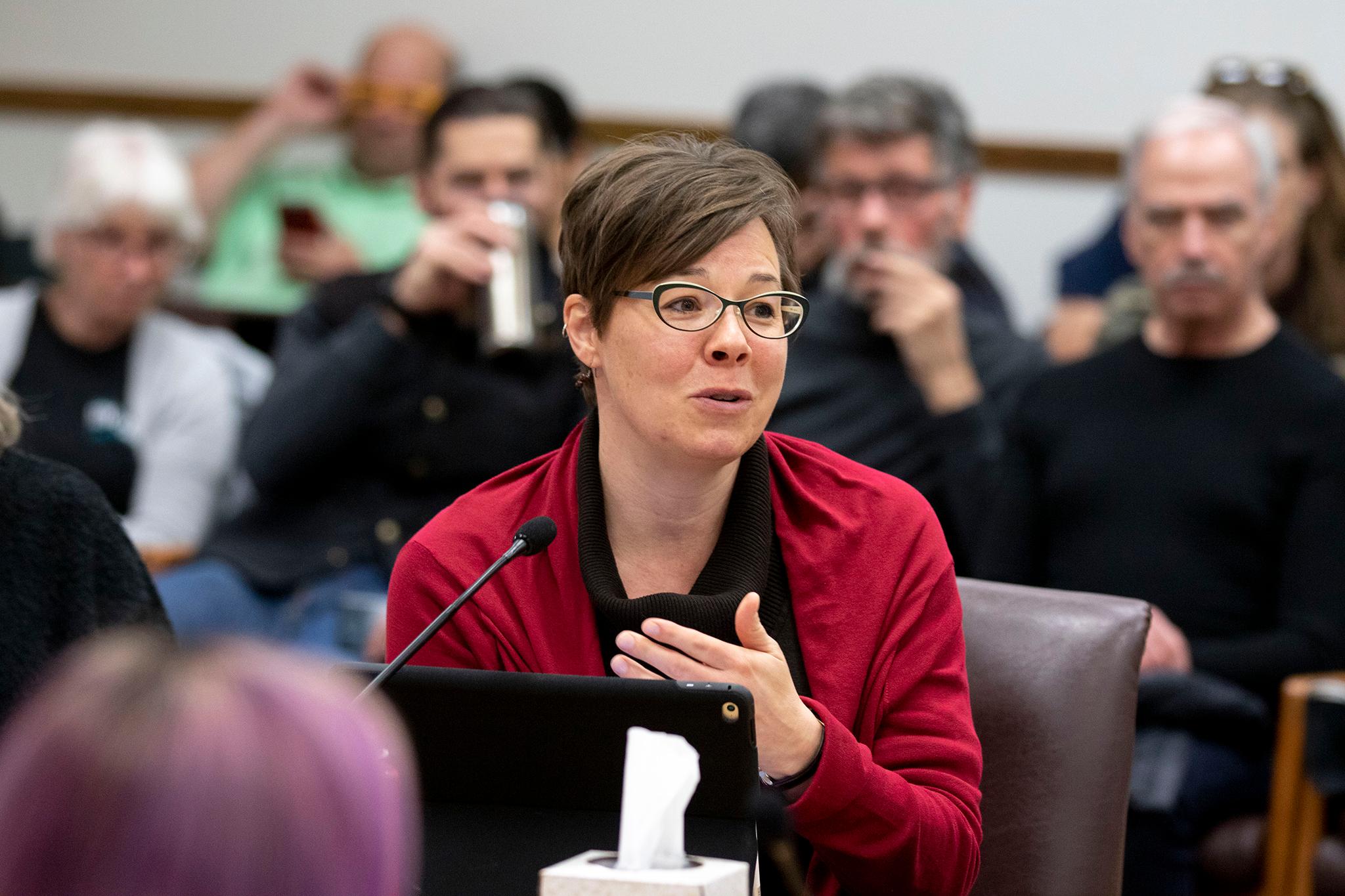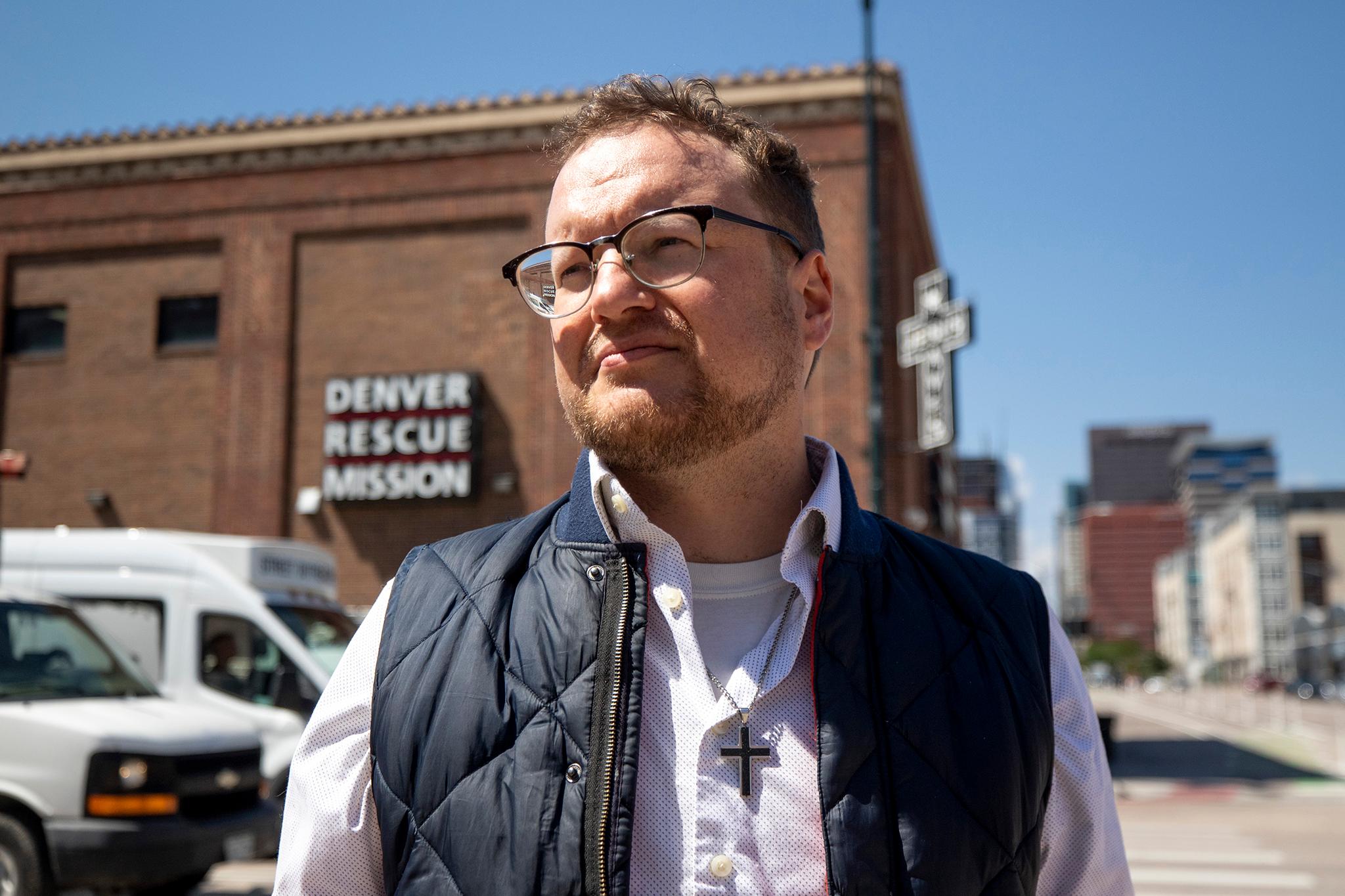The Denver Anti-Discrimination Office has charged the Denver Rescue Mission for allegedly discriminating against former director Kyle Fischler over his sexuality, religious views and disability. His attorney, Laura Wolf, has filed an additional complaint with the Colorado Anti-Discrimination Office.
The Denver Rescue Mission, a nondenominational Christian nonprofit with more than $22 million in active multiyear homeless-services contracts with the City of Denver, agreed to follow Denver's anti-discrimination laws to receive that money. But the charge and complaint state the nonprofit has violated the contracts and the law.
Fischler alleges he was technically fired for being late and missing work -- the first of which he acknowledges and the second he claims was fabricated.
He alleges in the complaints that the real reason he lost his job is because the nonprofit discriminated against him based on his sexuality, religion and disability. He also says leadership at the Denver Rescue Mission created a hostile work environment and refused to provide accommodations for his mental health issues, including post-traumatic stress disorder, anxiety and depression, they triggered by grilling him over his sexuality and putting anti-gay policies into the employee handbook.
"We are calling on Denver to end its contracts with the Denver Rescue Mission until the Mission commits to and takes concrete steps to comply with our anti-discrimination laws," Wolf said.
The Denver Rescue Mission declined to speak to the specifics of Fischler's termination.
"I am very disappointed that someone would make an accusation like this," said the mission's CEO Brad Meuli. "That said, we will not comment on threatened or pending employee litigation. As we have the last 131 years, we will continue to partner with this compassionate community to serve its most vulnerable."
When Fischler was hired as a director in 2021, he did not divulge his sexuality to leadership at the Denver Rescue Mission.
The organization operated under what he described as "a don't-ask-don't-tell" mentality, and he was not aware of anybody being openly gay to their supervisors.
As a director, he oversaw several dozen staff members and worked at 21 different locations, including shelters, hospitals and community organizations, largely setting his own schedule and sometimes working odd hours.
In his short time with the organization, he says he received a pay raise and stayed out of trouble.
The big cross outside the Downtown shelter first inspired Fischler to work for the organization. He'd always been a faith-based person, rarely missing a week of church, and he was thrilled to work for a Christian nonprofit.
Halfway through 2022, he found himself sitting across from his boss's massive desk decorated with an angel sculpture, he told Denverite in an interview. Bible verses decorated the walls. But he wasn't in the room to discuss scripture or shared faith. He was there to be disciplined.
He had posted about his thoughts on abortion on Facebook. One of his bosses told him that he shouldn't express his opinions and list his place of work as Denver Rescue Mission on Facebook, he recalled. He understood that reprimand and why the organization wouldn't want him debating in public as one of the directors at the organization.
But the conversation didn't end there.
"We found out something about you we wanted to talk about," Fischler said he remembers his boss saying. "We found out through the grapevine that you went gay speed dating. This is all new information for us about you."
More than a decade ago, Fischler said he had struggled to reconcile his sexuality with his Christian faith. He tried dating women. He attended a Catholic college. He had worked at various Christian organizations with explicit anti-gay policies, including Focus on the Family. In 2010, against his mother's wishes, he even went to conversion therapy -- an attempt to change his sexuality that left him having panic attacks and feeling suicidal, he said.
But over the years he came to terms with being gay and Christian, and he couldn't figure out what his bosses at the Denver Rescue Mission thought speed dating had to do with his passion for serving people experiencing homelessness.
"I don't see how that's pertinent," he told them.
He remembered his boss saying that if he wanted to pursue relationships, they would have to discuss it and see if Fischler was a good fit for the Denver Rescue Mission.
"I'm curious what you're talking about because there's nothing written anywhere," he recalled saying.
Then, Fischler recalled, his bosses cautioned him that if he found a romantic partner, he would no longer be suited to work at the Denver Rescue Mission.
"There's nothing written anywhere about this," he recalled reiterating to his boss.
"That's true," he said she answered.
Denver Rescue Mission declined to comment on the specifics of his interactions with the organization.

Fischler said leadership at the Denver Rescue Mission always approached such conversations with a smile, but in the end, when staff violated the brand of Christianity of the nondenominational nonprofit, they were eventually pushed out. He'd seen it before from his own staff -- when an unmarried employee was pregnant and when a coworker explored Islam.
Sweat poured down Fischler's face as his bosses questioned him, and he began to shake, Fischler recalled. The bosses sat there, looking at him, with no response. He stood and rushed to the bathroom, where he cried until he could gather himself enough to leave the Rescue Mission.
He left that day with thoughts of suicide and said he even drove to a hospital to check himself in but ultimately didn't.
Back home, he called his mom. "I'm not doing so well," he said. He went to her house, and she comforted him. Months after, he would lay in bed and think to himself, "I do not want to exist anymore. I'm trying to be a Christian, but I don't fit in Christian spaces. I don't fit in gay spaces. I don't fit anywhere. Why did God do this to me?"
Just like when he was in conversion therapy, he'd wake up with a panic attack. He'd try to go back to sleep but couldn't.
For a while, he'd say, "I can't go to work," and then after breathing through the anxiety, he'd change his mind. "Fine, I'm gonna go to work."
He said he would occasionally show up 30 minutes late, still in a "severe depressive state," but said he got his work done. He worked at multiple shelters across the system. His time was not tracked.
Outside of work, he said he started seeing a counselor and switched his psychiatric medications to address his moods, anxiety and PTSD.
In the fall of 2022, a new employee handbook was published. Initially, it banned "homosexuality." Then that, an obvious violation of anti-discrimination policies, was changed to "acting on same sex attraction" and a "rejection of one's biological sex."
"After questions from current employees, as a Christian organization we are trying to provide clarity to our employees about our core values and what we believe," Denver Rescue Mission spokesperson Stephen Hinkle told Denverite shortly after the employee handbook was sent to employees. "Individuals who choose to work at Denver Rescue Mission do so because they are able to share their faith in an open and honest manner."
But the organization's policy flouted the contract between the Denver Rescue Mission and the City of Denver.
Shortly after Denverite broke the news in November about the ban on acting on same-sex attraction, the city rebuked the Denver Rescue Mission. "We are concerned and disappointed by these reports, and we will not tolerate discrimination in the provision of services or employment under contracts that are publicly funded and for the public good," said the Department of Housing Stability (HOST) in a statement.
"We are in conversations with our shelter providers to ensure they understand our commitment to equity and that non-discrimination practices are carried out and adhered to in City-funded facilities, operations and employment," HOST added. "We stand with our LGBTQ+ community and will continue work to ensure city-contracted facilities and services are safe and welcoming without discrimination."
The mission temporarily changed its policy: "After dialogue with the Denver Rescue Mission's Board of Directors and Senior Leadership team today, we have determined it is appropriate to re-evaluate recent changes made to our Employee Handbook and have paused its implementation," the organization said in a statement, a few days after Denverite's story published.
Fischler said that in his time there, he could not recall internal conversations about inclusivity.

Two days before Christmas, Fischler was fired for "missing work and being late to work," according to the charge against the Denver Rescue Mission. In his complaint, he denied ever missing work, but admitted to being tardy as a direct result of depression and PTSD brought on by his disciplinary meeting and the policy changes at work. He asked for accommodations and was told it was "too late."
The real reason for his termination, he alleged, was based on his identification with protected classes and his refusal to never act on his same-sex attractions.
The City of Denver and Mayor Michael Hancock's administration tout equity as a core value. That's reinforced by city law.
Denver has a law that prohibits discrimination in both who receives services and who can be employed by city contractors based on sexual orientation, gender identity, and gender expression, according to Derek Woodbury, a spokesperson for HOST.
"We have received and reviewed Denver Rescue Mission's recent policy changes to ensure they meet these non-discrimination requirements," he wrote. "We appreciate their willingness to work with us to ensure non-discrimination practices are carried out and adhered to in City-funded facilities, operations and employment.
"Since the beginning of this year, we have further required homeless resolution program providers to submit their policies to us for review in advance of any new or contract extension to ensure they meet or exceed our non-discrimination requirements before the request is submitted to City Council for consideration," he added. "We have also asked for information on how employees are informed of these policies."
The contract the Denver Rescue Mission signed with the city states that the organization will not discriminate based on religion. Yet, according to its official policy, the nonprofit only hires those who are Christians.
On the Denver Rescue Mission career services page, the group maintains it only hires those who agree with the group's Christian Mission and Statement of Faith, which includes believing in the following:
The Denver Rescue Mission's anti-discrimination statement does not cite religion as a protected class.
Here's how the Denver Rescue Mission defends its discrimination against people of other religions -- and even varying Christian theologies -- in its anti-discrimination policy: "Based upon Title VII of the Civil Rights Act of 1964, the Colorado Anti-Discrimination Act, and the U.S. Constitution, Denver Rescue Mission has the right to, and does, hire only candidates who agree with our Statement of Faith and align with our Christian mission."
In a job recruitment video, the Denver Rescue Mission's CEO Meuli described the nonprofit's struggle to stay staffed as "a challenge."
"As you know, it's a tough time in the labor market right now, and we're trying to fill incredibly needed open positions to serve our neighbors experiencing homelessness," he said. "So I'm reaching out to you today as fellow believers in Jesus to prayerfully consider how God might be moving in your life, how God might be stirring in your heart to serve at Denver Rescue Mission."
Currently, 28 positions are posted online, from counselors to custodians and chefs to drivers and warehouse assistants. Some have been listed for months.
Fischler said he is perplexed why an organization struggling to keep up with its work would limit who it can hire. He believes the policy isn't just hurting people like him but the organization itself.
"Despite its contracts with Denver, the Mission only hires Christians who agree to abide by its conservative Ministry Principles," said Fischler's attorney Wolf. "We are dismayed that the Mission refuses to allow people of different faiths to serve the homeless, and we are deeply concerned that Denver continues to fund its operations."
On the organization's career page, the mission states: "Every position at the Mission is an opportunity for ministry and is vital to the fulfillment of our mission."
Fischler's attorney Wolf described the statement as a potential "loophole to get around anti-discrimination laws" to claim that every position, from janitor to CEO, is a spiritual guide to guests -- something akin to a priest.
In 2012, the Supreme Court ruled that ministerial exceptions can be made that narrow the scope of how anti-discrimination policies are applied to certain ministerial positions within religious organizations.
Could the Denver Rescue Mission's broad statement about every position being an opportunity for ministry give the organization legal standing to continue to discriminate across the board? The Denver Rescue Mission declined to answer, citing Fischler's active case.
When asked whether the organization's anti-discrimination policy was still in effect and whether the Denver Rescue Mission practiced it, Hinkle pointed to a Denverite story about the change in policy and noted that the City had "received and reviewed" the mission's employment policies and determined they conformed to the law, noting the policies had not changed since.
HOST did not directly address specific questions about the Denver Rescue Mission's anti-discrimination clause that allows for religious discrimination that contradicts the contract the organization signed with the city that prohibits religious discrimination.
"We are aware of the evolving law surrounding religious organizations and regularly consult with the City Attorney's Office on legal matters," wrote HOST spokesperson Derek Woodbury.

City Councilmember Robin Kniech, who is an attorney, has not reviewed the specific charges of this case.
"I wholeheartedly stand by the city's values and broad expectations of non-discrimination, because I believe they result in attracting the best workforce to inclusively serve the people of our diverse city," Kniech wrote to Denverite.
"I also must acknowledge the fact courts grant latitude to religious employers to prefer individuals of their own religion in certain hiring decisions," she added.
City Council voted on a recent contract with the Denver Rescue Mission on consent -- meaning it was not discussed at passage and voted on in a block.
"Denver's approach to contracting policies and decisions is guided by the advice of our counsel," Kniech said. "I believe everyone has the right for the facts of their cases to be heard and be judged under the law."
Here's what's next.
The Denver Rescue Mission had until July 6 to decide whether it would request mediation in the Denver Anti-Discrimination Office case. It was unclear how or if the Denver Rescue Mission responded to the charge by the deadline.
If the mission decides to proceed with a case, the nonprofit has until July 22 to provide a written statement on the issues covered in the discrimination claim, with documents substantiating the organization's position.
"Complainants may choose to file civil actions in the County Court or State District Court, after exhausting administrative remedies," wrote Heidi Rodriguez, a spokesperson for the Denver Anti-Discrimination Office.
Fischler, himself, has found another job at a faith-based organization that receives government funding and abides by its anti-discrimination policies while still being rooted in Christianity. He says it's a welcoming environment where he can be openly gay.
He wishes the Denver Rescue Mission abided by the same practices to allow people like himself to serve those most in need and contribute to the organization's important work with unhoused residents.
"Faith has always been extremely important to me," Fischler said. "It's one of the signature components of my life. I'm a Christian."
This story has been updated with a comment from Heidi Rodriguez, a spokesperson for the Denver Anti-Discrimination Office.












